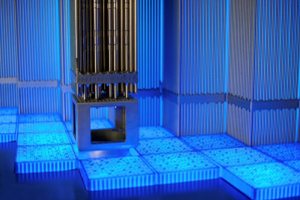Feb 5 2011
IBC Advanced Alloys Corp. ("IBC" or the "Company") has successfully completed the current phase of its beryllium oxide nuclear fuels research and development project with Purdue University (Purdue) and Texas Engineering Experiment Station (TEES), a member institution of The Texas A&M University System.
The initial testing shows UO2-BeO fuel to be longer lasting, more efficient and that it provides a larger safety margin than current nuclear fuels.
 The initial testing shows UO<sub>2</sub>-BeO fuel to be longer lasting, more efficient and that it provides a larger safety margin than current nuclear fuels.
The initial testing shows UO<sub>2</sub>-BeO fuel to be longer lasting, more efficient and that it provides a larger safety margin than current nuclear fuels.
The R&D project was announced in August 2008 with the objective of advancing the universities' existing nuclear fuels research program, and developing a beryllium oxide enhanced nuclear fuel, for commercial use in both current and future nuclear power reactors.
"This collaborative nuclear fuels R&D work with Purdue and TEES is developing technology that could positively affect both the nuclear industry and consumers of alternative energy," said Anthony Dutton, President and CEO of IBC Advanced Alloys. "This most recent phase of the work confirms our belief that beryllium oxide enhanced fuel will advance global nuclear fuels technology and, as a result, considerably increase demand for beryllium as a rare metal commodity."
The initial testing included nuclear engineering simulations and thermal modeling which successfully demonstrated the potential benefits of this fuel in Light Water Reactor systems. The experimental and computational work carried out to date provides a solid understanding of unirradiated UO2-BeO behaviour and a clear path for additional work. Preliminary processing methods have been experimentally demonstrated to produce materials for validation measurements; this work will continue in the next phase along with an expanded research mandate to further validate the technology and complement the work to date.
In order to market enhanced nuclear fuel for commercial use, it will be necessary to undertake systematic design analysis, complete prototype irradiation tests, obtain performance data, and undertake high quality fabrication, among other steps. These steps will require the assistance of industrial collaborators.
"Our recent research has yielded important advances in the technology with potentially significant value to the industry. Beryllium oxide-enhanced nuclear fuel research findings were presented to the September 2010 Top Fuels Light Water Reactor Fuel Performance Meeting which was hosted by the American Nuclear Society in Orlando, Florida," continued Dutton, "Further, Purdue and IBC have filed patents to protect the IP covering the research. IBC is currently considering suitable industry partners for the next phase of testing and development, and is looking forward to continuing its work with Purdue and TEES for the benefit of industry and IBC shareholders."